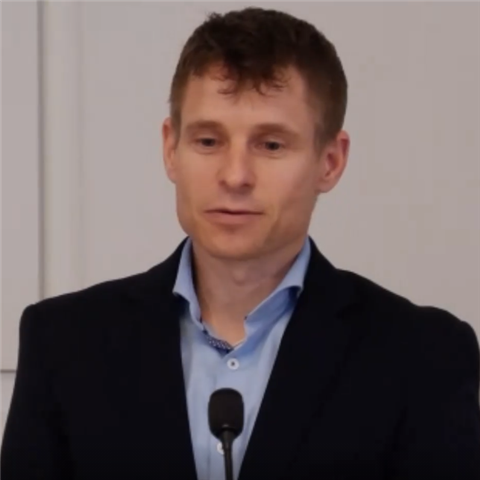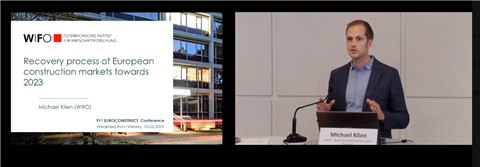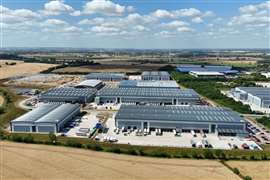Euroconstruct debates the future of construction
27 August 2021
Eminent European construction market analysis body delivers forecasts on major European nations via virtual conference. Mike Hayes reports.
The highly anticipated two-day 91st biannual Euroconstruct conference opened in Vienna, Austria on 10 June 2021. This event provided analysis of the construction markets for 19 member nations – primarily EU member states, but also Norway, Switzerland and the United Kingdom – that provides a broad and measured overview of the European construction sector.
This conference was hosted virtually by the Austrian Institute of Economic Research with economic overviews heard from such esteemed organisations as the Austrian National Bank and Raiffeisen Bank International.
Christoph Badelt, from the Austrian Institute of Economic Research, introduced the conference. He reminded the audience that the construction sector is “one of the most dynamic sectors in the economy” and stressed that, throughout the course of the Covid-19 pandemic from an Austrian perspective, construction had fared better than the total economy.
Gunter Deuber, head of research at Raiffeisen Bank International, also touched on the general economic outlook. He referred to what we are experiencing as “a long-lasting and well-staged global boom” as opposed to a tepid recovery.
He affirmed that because Europe partly entered the Covid-19 crisis in “a solid shape” there was a danger of it entering the recovery stage “almost too well”, and indicated certain oversupply risks.
Deuber added that favourable funding conditions were in place “especially for the building materials sector”. However, he stated that the supply shortages, which have been widely reported recently, should last a few months although could subside over time.
 Gunter Deuber believes that there is “a long-lasting and well-staged global boom”
Gunter Deuber believes that there is “a long-lasting and well-staged global boom”
ESG issues becoming core business priorities
He believed that there was a growing sense that ESG (Environmental, Social and Governance) was set to develop into a full mainstream topic in the construction and real estate sectors, which must take note of this trend in order to keep credit lines open with banks.
In a Q&A session following his presentation, Deuber was asked about the specific criteria that would need to be met to secure funding on an ESG basis, especially for materials producers.
He remarked that banks are currently in a “standard-finding phase with ESG”, but stressed that “the ESG trend in financing is not about being the best in class, or having everything ESG-conformed today”.
Deuber added, “There are certain parts of the value chain in the building and construction sector, as well as the cement industry, that are not seen too favourably from an ESG perspective. But to work on improvement is already sufficient to qualify for ESG financing.”
Micheal Klien of the Austrian Institute of Economic Research gave an overview of the recovery analysis from a Euroconstruct perspective, describing a quick recovery through 2021, but slightly delayed due to new lockdowns at the beginning of the year. This has lead to a repeated increase in 2022, following the anticipated end to all Covid-19 measures in Europe.
He noted that construction was currently more stable than the general economy, with its dip in 2020 not as deep as that of GDP, and, conversely, its rebound a little weaker.
He also highlighted business confidence surveys, saying, “We see that in all Euroconstruct countries, construction companies are more optimistic than they were at the start of the year. This is very unusual for Euroconstruct, a unanimous union across all countries.
“Civil engineering will remain the powerhouse in the Euroconstruct 19 areas over the next few years, and this is a continuation of the trend that we saw in the last few years.
“Growth prospects are somewhat muted, so the recovery is weakest in this sector [non-residential construction]. Residential construction is following a very stable growth path. It exhibits a quick recovery in 2021, according to our forecasts, but then begins to lose momentum somewhat, until 2023.”
 Micheal Klien's presentation at the 2021 Euroconstruct conference included concerns about construction prices and the shortage of construction material
Micheal Klien's presentation at the 2021 Euroconstruct conference included concerns about construction prices and the shortage of construction material
Optimistic outlook for construction sector
Klien ended his presentation with two elements that could change the positive outlook for the industry.
The first was the shortage of construction material, and he echoed the concerns of Deuber by stating, “This is quite unusual, from my perspective, because [in 30 years of surveys] we have never had such a high number of people responding by saying materials shortages are actually hampering their production.”
The second, which is partly related to the materials shortage, was construction prices.
Klien explained, “Due to the restrictions we have some ramped up demand. In many countries, we also had full order books before the crisis and we would expect some price increase. But the levels we are seeing now are really starting to give cause for concern.”
In terms of the Euroconstruct forecast, Klien said continuing rising prices in construction could lower demand and therefore lower the recovery forecast.





